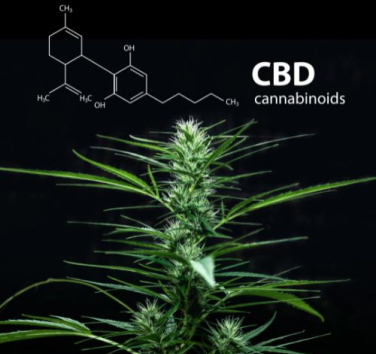What is the endocannabinoid system?
The endocannabinoid system, or ECS, is a complex set of receptors, enzymes and biochemical molecules that regulate a number of physiological and cognitive functions in vertebrates, including humans. We are talking in particular about appetite, the sensation of pain, mood, memory and... the body's response to situations of stress and anxiety!
To play its physiological role, the endocannabinoid system relies on “CB 1” and “CB 2” type cannabinoid receptors, scattered throughout the body (including in the brain). These are activated by substances called endocannabinoids, produced naturally by the body.
But they can also be activated by “external” cannabinoids, which are mainly found in the Cannabis L. Sativa and Cannabis Indica strains of the hemp plant. Some are psychotropic (like THC), that is to say they alter cognitive functions, others are not and have no impact on discernment, like cannabidiol (CBD), but also CBG, CBN and CBC.
How does the endocannabinoid system deal with stress?
Everything goes through the regulation of the hypothalamic-pituitary-adrenal (HPA) axis, which is the main axis of response to stress and anxiety in the body. Endocannabinoids , particularly anandamide, up- or down-regulate this axis to influence the production of cortisol, the main stress hormone.
When the body is faced with a stressful situation, endocannabinoid levels fluctuate. Normally, they should promote the reduction of activation of the HPA axis and attenuate the body's response. They exert this effect by binding to cannabinoid “CB 1” receptors in the brain.
Dysfunctions of the ECS are common, including reduced levels of anandamide or changes in “CB 1” receptor expression. They cause mood disorders like anxiety and depression.
CBD, the endocannabinoid system and stress
CBD is therefore one of the non-psychoactive cannabinoids that interact with the “CB 1” and “CB 2” receptors of the endocannabinoid system to regulate its functioning and restore its balance, if necessary. Its impact on stress and anxiety occurs mainly through indirect mechanisms, and this is what explains the absence of any psychotropic effect.
First, CBD increases anandamide levels by inhibiting the FAAH enzyme which degrades this hormone. With a higher concentration of anandamide in the body, feelings of pain and stress are soothed.
Next, CBD influences the serotonergic system which is involved in the regulation of mood and behavior linked to anxiety. CBD acts on serotonin receptors, in particular 5- HT1A, to promote an anti-anxiety response which results in a state of serenity and well-being.















